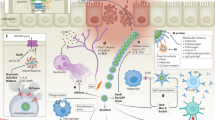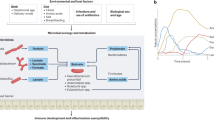Abstract
Objective:
To assess the impact of zinc supplementation on clinical recovery, weight gain and subsequent growth and morbidity in moderately malnourished children with shigellosis.
Design:
A randomized, double-blind, controlled trial.
Setting:
Dhaka hospital of ICDDR,B: Centre for Health and Population Research, Dhaka, Bangladesh.
Subjects:
Fifty-six moderately malnourished children, aged 12–59 months with culture-proven shigellosis.
Methods:
Subjects were randomly allocated to receive zinc (20 mg/day elemental) in multivitamin syrup (intervention) or multivitamin syrup without zinc (control) in two equally divided doses daily for 2 weeks. All children received pivmecillinam in a dose of 15 mg/kg every 6 h for 5 days. After supplementation, children were followed in their respective homes every 2 weeks for 6 months.
Results:
Children receiving zinc recovered from acute illness significantly faster than the control children (P<0.05). The medians time (days) to recovery and disappearances of blood and mucous were significantly 50% shorter in the zinc-supplemented group compared to the control group. The mean body weight of zinc supplemented children increased significantly from 8.8 kg on admission to 9.2 kg (P<0.01) at recovery, which was not observed in the control children (from 9.3 to 9.6 kg; P=0.12). During the 6-month follow-up period, zinc-supplemented children had significantly fewer mean episodes of diarrhoea compared to the control children (2.2 vs 3.3; P=0.03).
Conclusion:
Zinc supplementation significantly shortens the duration of acute shigellosis, promotes better weight gain during recovery and reduces diarrhoeal morbidity during the subsequent 6 months.
This is a preview of subscription content, access via your institution
Access options
Subscribe to this journal
Receive 12 print issues and online access
$259.00 per year
only $21.58 per issue
Buy this article
- Purchase on Springer Link
- Instant access to full article PDF
Prices may be subject to local taxes which are calculated during checkout


Similar content being viewed by others
References
Alam AN, Sarker SA, Wahed MA, Khatun M, Rahman MM (1994). Enteric protein loss and intestinal permeability changes in children during acute shigellosis and after recovery: effect of zinc supplementation. Gut 35, 1707–1711.
Bennish ML, Salam MA, Wahed MA (1993). Enteric protein loss during shigellosis. Am J Gastroenterol 88, 53–57.
Black RE, Brown KH, Becker S (1984). Effects of diarrhoea associated with specific enteropathogens on the growth of children in rural Bangladesh. Pediatrics 73, 799–804.
Broek JM, Roy SK, Khan WA, Ara G, Chakrobarty B, Islam S et al. (2005). Risk factors for mortality due to shigellosis: a case control study among severely-malnourished children in Bangladesh. L Health Popul Nutr 23, 250–258.
Brooks WA, Santosham M, Naheed A, Goswami D, Wahed MA, Diener-west M (2005). Effect of weekly zinc supplements on incidence of pneumonia and diarrhoea in children younger than 2 years in an urban, low-income population in Bangladesh: randomized controlled trial. Lancet 17–23 366, 999–1004.
Castillo-Duran C, Vial P, Uauy R (1988). Trace mineral balance during acute diarrhoea in infants. J Pediatr 113, 452–457.
Golden MHN, Golden BE (1981). Effect of zinc supplementation on the dietary intake, rate of weight gain and energy cost of tissue deposition in children recovering from severe malnutrition. Am J Clin Nutr 34, 900–908.
Henry FJ, Alam N, Aziz KMS, Rahman MM (1987). Dysentery, not watery diarrhoea, is associated with stunting in Bangladeshi children. Hum Nutr Clin Nutr 41c, 243–249.
Hossain S, Biswas R, Kabir I, Sarker S, Michael Dibley, Fuchs G et al. (1998). Single dose vitamin A treatment in acute shigellosis in Bangladeshi children: randomized double blind controlled trial. BMJ 316, 422–426.
Kabir I, Malek Ma, Mazumder RN, Rahman MM, Mahalanabis D (1993). Rapid catch up growth of children fed a high-protein diet during convalescence from shigellosis. Am J Clin Nutr 57, 441–445.
Kabir I, Rahaman MM, Ahmed SM, Akhter SQ, Butler T (1984). Comparative efficacies of pivmecillinam and ampicillin in acute shigellosis. Antimicrob Agents Chemother 25, 643–645.
Khan WA, Seas C, Dhar U, Salam MA, Bennish ML (1997). Treatment of shigellosis: V. Comparison of azithromycin and ciprofloxacin. A double blind, randomized, controlled trial. Ann Intern Med 126, 697–703.
Kirkwood BR (1988). Essential of Medical Statistics. Blackwell Scientific Publications, Oxford, London: Edinburgh, 45: 39A, pp 197.
Koo SI, Turk DE (1977). Effect of zinc eficiency on the ultrastuctures of the pancreatic aciner cell and intestinal epithelium I rat. J Nutr 107, 896–908.
Kotloff KL, Winicoff JP, Ivanoff B, Clemens JD, Swerdlow DL, Sansonetti PJ et al. (1999). Global burden of Shigella infection: implications for vaccine development and implementation of control strategies. Bull World Health Organ 77, 651–666.
Mitra A, Alvarez JO, Guay-Woodford LG, Fuchs GJ, Wahed MA, Stephenson CB (1998). Urinary retinol excretion and kidney function in children with shigellosis. Am J Clin Nutr 68, 1095–1103.
Rahman MJ, Sarker P, Roy SK, Ahmed SM, Chisti J, Azim T et al. (2005). Effects of zinc supplementation as adjunct therapy on the systemic immune responses in shigellosis. Am J Clin Nutr 81, 495–502.
Raqib R, Roy SK, Rahman MJ, Azim T, Ameer SS, Chisti J et al. (2004). Effect of zinc supplementation on immune and inflammatory responses in patients with shigellosis. Am J Clin Nutr 79, 444–450.
Roy SK, Behrens RH, Haider R, Akramuzzaman SM, Mahalanabis D, Wahed MA et al. (1992). Impact of zinc supplementation on intestinal permeability in Bangladeshi children with acute diarrhoea and persistent diarrhoea syndrome. J Pediatr Gastroenterol Nutr 15, 289–296.
Roy SK, Ireen S, Hossain MJ, Ara G, Ahmed S, Chakraborty B et al. (2006a). Impact of zinc supplementation to children with cholera admitted to an urban hospital in Bangladesh. 8th Commonwealth Congress on Diarrhoea and Malnutrition, CAPGAN, 15 (Abstract).
Roy SK, Tomkins AM (1989). Impact of experimental zinc deficiency on growth, morbidity and ultrastructural development of intestinal tissue. Bangladesh J Nutr 2, 1–7.
Roy SK, Tomkins AM, Ara G, Jolly SP, Khatun W, Chowdhury R (2006b). Impact of zinc deficiency on v. cholera enterotoxin stimulated water and electrolyte transport in animal model. J Health Popul Nutr 24, 42–47.
Roy SK, Tomkins AM, Haider R, Behren RH, Zaman SMA, Mahalanabis D et al. (1999). Impact of zinc supplementation on subsequent growth and morbidity in Bangladeshi children with acute diarrhoea. Eur J Clin Nutr 53, 529–534.
Roy SK, Tomkins AM, Mahalanabis D, Zaman SMA, Haider R, Behrens RH et al. (1998). Impact of zinc supplementation on persistent diarrhoea in malnourished Bangladeshi children. Acta Paediar 87, 1235–1239.
Roy SK, Tomkins AM, Zaman SMA, Behrens RH, Haider R, Mahalanabis D et al. (1997). Randomized controlled trial of zinc supplementation in malnourished Bangladeshi children with acute diarrhoea. ArcDis Child 77, 196–200.
Roy SK, Tomkins AM, Akramuzzaman SM, Chakraborty B, Ara G, Biswas R et al. (2007). Impact of zinc supplementation on subsequent morbidity and growth in Bangladeshi children with persistent diarrhoea. J Health Popul Nutr 25, (in press).
Sazawal S, Black RE, Bhan MK, Jalla S, Bhandari N, Sinha A et al. (1996). Zinc supplementation reduces the incidence of persistent diarrhoea and dysentery among low socioeconomic children in India. J Nutr 126, 443–450.
Simer K, Khanum S, Carlson L, Thompson RPH (1988). Nutritional rehabilitation in Bangladesh – the importance of zinc. Am J Clin Nutr 47, 1036–1040.
Speelman P, Kabir I, Islam M (1984). Distribution of and spread of colonic lesions in Shigellosis: a colonoscopic study. J Infect Dis 150, 899–903.
The Zinc Investigators' Collaborative Group Zulfiqar AB, Sheila MB, Robert EB, Kenneth HB, Julie MG, Adi H et al. (2000). Therapeutic effects of oral zinc in acute and persistent diarrhea in children in developing countries: pooled analysis of randomized controlled trials1–3. Am J Clin Nutr 72, 1516–1522.
World Health Organization (1983). Measuring Change in Nutritional Status. Guidelines for Assessing the Nutritional Impact of Supplementary Feeding Programmes for Vulnerable Groups. WHO: Geneva.
Acknowledgements
This research protocol/activity/study was funded by United States Agency for International Development (Grant no. HRN-A-00-96-90005-00) and Swedish Agency for Research Co-operation with Developing Countries (Sida/SAREC Agreement support; Grant 20002-2004). ICDDR,B acknowledges with gratitude the commitment of USAID and Sida/SAREC to the Centre's research efforts.
Author information
Authors and Affiliations
Corresponding author
Additional information
The Trial Registration:
The trial was registered on 08/05/2006 according to the clinical trial protocol registration system and the registration number is ‘NCT00321126’.
Rights and permissions
About this article
Cite this article
Roy, S., Raqib, R., Khatun, W. et al. Zinc supplementation in the management of shigellosis in malnourished children in Bangladesh. Eur J Clin Nutr 62, 849–855 (2008). https://doi.org/10.1038/sj.ejcn.1602795
Received:
Revised:
Accepted:
Published:
Issue Date:
DOI: https://doi.org/10.1038/sj.ejcn.1602795
Keywords
This article is cited by
-
Protective Effects of Zinc on Salmonella Invasion, Intestinal Morphology and Immune Response of Young Pigeons Infected with Salmonella enterica Serovar Typhimurium
Biological Trace Element Research (2022)
-
Interventions to reduce post-acute consequences of diarrheal disease in children: a systematic review
BMC Public Health (2018)
-
Evaluation of the role of zinc supplementation in treatment of diarrhoea in paediatric patients: a randomized open-label study
Drugs & Therapy Perspectives (2015)



